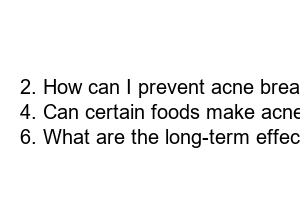다래끼 나는 이유
Acne can be a frustrating and stubborn skin condition that affects people of all ages. Whether you’re a teenager going through puberty or an adult dealing with hormonal changes, it’s important to understand why acne occurs in the first place. Let’s explore the reasons behind this pesky skin issue and learn how to manage it effectively.
**1. Hormonal Imbalance**
Hormonal imbalance is one of the primary causes of acne. When hormones fluctuate, especially during puberty or menstruation, they can stimulate the sebaceous glands in your skin to produce excess oil. This can lead to clogged pores and the formation of acne.
**2. Genetics**
If your parents or siblings have a history of acne, there’s a good chance that you may be prone to it as well. Genetics play a significant role in determining your skin type and how your body responds to hormonal changes, making you more susceptible to breakouts.
**3. Diet**
What you eat can also have a direct impact on your skin. Consuming a diet high in processed foods, sugar, and dairy products can trigger inflammation in your body, leading to acne. Opting for a balanced diet rich in fruits, vegetables, and whole grains can help reduce the risk of breakouts.
**4. Stress**
Stress is a common trigger for acne flare-ups. When you’re stressed, your body releases cortisol, a hormone that can stimulate your oil glands and increase sebum production. Finding healthy ways to manage stress, such as exercise or meditation, can help improve your skin’s condition.
**5. Skincare Products**
Using the wrong skincare products can exacerbate acne. Some products contain harsh ingredients that can strip your skin of its natural oils or clog your pores, leading to breakouts. Opt for non-comedogenic products that are gentle on your skin and won’t aggravate acne.
**6. Environmental Factors**
Environmental factors, such as pollution and humidity, can also contribute to acne. Pollutants in the air can clog your pores and trigger inflammation, while humidity can increase oil production and worsen breakouts. Be mindful of your surroundings and take steps to protect your skin from external aggressors.
In conclusion, acne can be caused by a combination of hormonal imbalance, genetics, diet, stress, skincare products, and environmental factors. By understanding the root causes of your acne, you can take proactive steps to manage it effectively and achieve clearer, healthier skin.
**FAQs:**
1. What are the best skincare products for acne-prone skin?
2. How can I prevent acne breakouts during menstruation?
3. Is it safe to pop pimples?
4. Can certain foods make acne worse?
5. Should I see a dermatologist for my acne?
6. What are the long-term effects of untreated acne?

